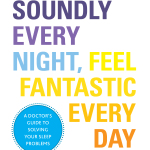I am happy to introduce a sleep expert specializing in adult sleep. Like our children , we, too, can develop bad sleep habits and sleep crutches throughout life. Dr, Rosenberg’s book addresses many sleep disorders and ways to develop better sleeping habits and have overall improved health. Be sure to enter below to win a copy of his book, Sleep Soundly Every Night, Feel Fantastic Every Day.
Dr. Robert S. Rosenberg has more than 20 years of experience in the field of sleep medicine. Besides operating the Sleep Disorders Center of Prescott Valley, AZ, Rosenberg’s sleep advice has appeared in O, The Oprah Magazine, Prevention, Women’s Health, Woman’s World, Parenting, and Ladies Home Journal, among other publications.
Better Sleep Quick Reference excerpt from Sleep Soundly Every Night, Feel Fantastic Every Day by Dr. Robert S. Rosenberg
Good sleep practices are necessary to have normal, quality sleep time, and full alertness during the day. I recommend these better sleep guidelines:
1. Get up and go to bed at the same time each day.
This practice may be difficult at first, especially given our busy and often erratic schedules. Yet those scheduled activities for work, school, exercise, errands, and family also help to regulate your internal body clock’s time to go to bed at the same time each night. Adhering to a sleep routine helps to regulate our circadian rhythm. Be sure to stick with the schedule on the weekend, too. Staying up until 3:00 a.m. on Saturday night and sleeping in on Sunday may throw off the rhythm you established throughout the week.
2. Make your bedroom conducive to sleep.
Studies show that it is easiest to fall asleep in a cool, quiet, and dark environment. I recommend your bedroom temperature remain around 68°F. Be sure to eliminate as much noise and light as possible. If it gets too warm, make sure you adjust the temperature and use a fan or air conditioner so that the heat does not wake you up in the middle of the night.
3. Keep the electronics out of the bedroom and don’t use them right before sleep.
It is very important to avoid television, electronic games, and computers right before going to bed. In fact, they should be kept out of the bedroom altogether. These things stimulate the brain and make it much more difficult to fall asleep. Even the light of a computer screen can keep your brain from relaxing. The same is true of your cell phone. Even if the ringer is off, the light from the phone or the sound of it vibrating can interrupt your sleep. The light hitting the retina suppresses the production of your sleep hormone melatonin.
4. Avoid caffeine, alcohol, and nicotine four to six hours before bedtime.
 It’s not good enough to avoid that late night espresso. Any caffeine ingested in the late afternoon or early evening can affect your sleep. Remember that this stimulant is not only found in drinks such as coffee, soda, and tea, but it is also found in certain foods, such as chocolate. Some people are surprised to learn that nicotine and even alcohol can disrupt sleep. While alcohol might make you feel drowsy initially, it just as easily interrupts the stages of sleep, even to the point where you get up in the middle of the night. As alcohol is metabolized and leaves your body, it causes a slight withdrawal characterized by an increase in activity of the sympathetic fight-or-flight nervous system and an elevation of the stress hormone cortisol.
It’s not good enough to avoid that late night espresso. Any caffeine ingested in the late afternoon or early evening can affect your sleep. Remember that this stimulant is not only found in drinks such as coffee, soda, and tea, but it is also found in certain foods, such as chocolate. Some people are surprised to learn that nicotine and even alcohol can disrupt sleep. While alcohol might make you feel drowsy initially, it just as easily interrupts the stages of sleep, even to the point where you get up in the middle of the night. As alcohol is metabolized and leaves your body, it causes a slight withdrawal characterized by an increase in activity of the sympathetic fight-or-flight nervous system and an elevation of the stress hormone cortisol.
5. Take a power nap for 30 minutes.
If you are sleep-deprived at night, you might want nothing more than to lie down during the day. Taking naps disrupts the natural drive to sleep at night, so in reality, you will only be perpetuating the cycle of insomnia. If you must nap, then take a power nap of no more than 30 minutes and not after 4:00 p.m. Otherwise, naps will decrease your brain’s drive for sleep that night.
6. Remove the television from the bedroom.
Your bedroom should be a place for calmness and rest where you sleep or connect with your partner, only.
7. Exercise each day, but avoid doing it four hours before bedtime.
Daily workouts have been shown to improve the quality of our sleep. But when you exercise within a few hours of bedtime, it will give you an energy boost that may prevent you from falling asleep. Exercising before sleep raises the core body temperature and elevates levels of cortisol and adrenaline, all of which prevent you from falling asleep.
8. Create a healthy bedtime ritual.
Nightly relaxing rituals can help prepare the body and mind to get ready for sleep. Take at least 15 minutes at the end of each day to read a book, listen to relaxing music, or soak awhile in a warm bath.
9. When you have trouble falling asleep, don’t stress out.
Everyone has tossed and turned a few nights in their life. But if you are sleep-challenged, one of the worse things you can do is to force the issue. Eventually, you will associate bedtime with anxiety and that can actually make the problem worse. The best thing to do is to get up, go to another quiet area of the house, and try to relax. When you feel ready to fall asleep, then head back to the bedroom.
10. Stop eating and drinking a few hours before going to bed.
You can be in the deepest sleep of your life, and still wake up from a full bladder. Also, if you have digestive problems such as heartburn or acid reflux, you are more likely to have an attack if you lie down so soon after eating.
11. Ignore your to-do list.
Have you gone to bed and then suddenly remembered that important thing you forgot to take care of?
If you’re one of those people who get out of bed to tackle the task, it’s time to stop! Sleep must be your priority now. Realize that only so many things can get done in one day. Of course, if the task is important enough that not doing it will keep you awake, then take care of it as quickly as possible. Also, though recreation is important, be sure to limit any activities that would infringe on the new sleep schedule. Your first priority right now should be to get your sleep regulated, if only because being well-rested will enable you to enjoy your waking hours all the more.
Enter to win your copy of Dr. Rosenberg’s new book here:
a Rafflecopter giveaway


